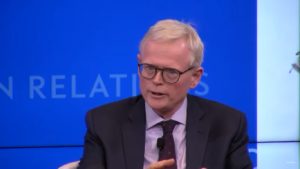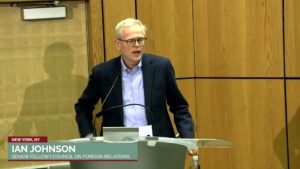
Foreign media too often focus on China’s crackdown on religion, but former foreign correspondent Ian Johnson, author of Sparks: China’s Underground Historians and their Battle for the Future, sees an opposite trend as China’s government started to support traditional faiths, in an effort to gain new legitimacy, he writes in the Council on Foreign Relations.
Ian Johnson:
China regularly ranks among the worst-performing countries on freedom of religion. That makes sense, given the crackdown on Muslim Uyghurs and the the destruction of Christian churches. These are the regular features of reports on China by the U.S. State Department and the U.S. Commission on International Religious Freedom, as well as international human rights monitoring groups.
But there is a flip side to the Chinese government’s approach to organized religions: over the past few years, some have begun to enjoy government support. This applies to much of China’s biggest religion, Buddhism, and its only indigenous religion, Taoism. The government has also endorsed folk religious practices that it once deemed superstitious, subsidizing pilgrimages and temples.
Driving these seemingly contradictory impulses is the ruling communist party’s need for new sources of legitimacy. With economic growth slowing, the long-standing social contract of prosperity in exchange for political acquiescence is less tenable. That’s caused the Chinese Communist Party (CCP), which still promotes atheism, to give overt support to traditional faiths…
In some ways, the Chinese state’s embrace of religion shouldn’t be too surprising. Beijing needs new sources of support, especially given China’s slowing economy. In addition, the disasters of communist rule in the twentieth century mean that for at least fifty years, few people have bought into the state’s main ideology, communism. Under Xi, China has pushed a return to communist values, urging the country’s nearly one hundred million CCP members to “return to the original mission.” Some of the party’s stated values include widely accepted virtues such as honesty, integrity, patriotism, and harmony. But belief in communism is low, forcing the state to turn to traditions.
In doing so, the CCP draws on China’s imperial past when ruling. Imperial officials often decided which faiths were orthodox and heterodox, regularly banning sects that violated norms. Indeed, traditional China was a religious state, with the emperor serving as the mediator between heaven and earth, and his main palaces—including the Forbidden City—representing the empire’s spiritual focal point.
China’s modern-day rulers have drawn on this past but also on the lessons of modern authoritarian states. Similar to how Russian President Putin evolved from KGB operative in Soviet times to defender of the Russian Orthodox Church today, Xi is positioning himself as a champion of Chinese traditional values. It’s unlikely Xi will ever be seen praying in a Buddhist temple, as Putin worships in churches. But in its own way, the Chinese Communist Party is taking a page out of the same authoritarian playbook, where endorsing traditions as a source of legitimacy is seen as a way to compensate for problems at home.
Much more at the website of the Council on Foreign Relations.
Ian Johnson is a speaker at the China Speakers Bureau. Do you need him at your meeting or conference? Do get in touch or fill in our speakers’ request form.
Are you looking for more stories by Ian Johnson? Do check out this list.

